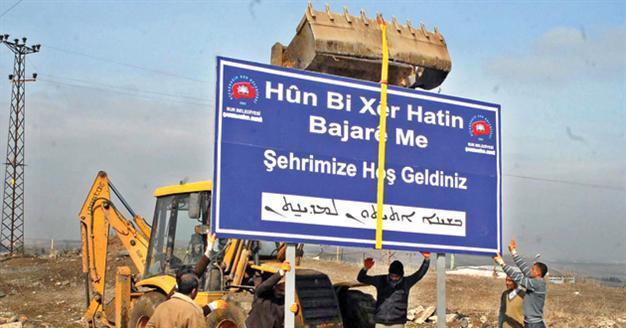Kurdish mayor decries ‘hypocrisy on language’
DİYARBAKIR - Hürriyet Daily News

Diyarbakır’s Sur Municipality hangs a sign on a Mardin Highway. The sign reads ‘Welcome to our city’ in Turkish, Kurdish and Syriac. There are 74 ongoing prosecutions against the Sur Mayor, most of them for multi-lingual municipal services. DHA photo
The mayor of Sur Municipality in Diyarbakır, who recently faced investigation for putting up multi-lingual signboards, has decried what he calls the government’s “hypocritical attitude” toward the use of Kurdish in public services.“We face a very strange situation. When the prime minister [Recep Tayyip Erdoğan] speaks Kurdish on TRT 6 [the state-owned channel that broadcasts in Kurdish] they call it a revolutionary development. But when we put multi-lingual signboards around the city our move was considered as a crime. Interestingly, some acts that are legal for the government are illegal for us,” Sur Mayor Abdullah Demirbaş said in a recent interview with the Hürriyet Daily News in Diyarbakır.
Maintaining his efforts to establish a multi-lingual municipality service since taking office in 2004, Demirbaş has faced dozens of investigations on the grounds that he breached the equality principle of the constitution. He was dismissed from his post by a Council of State ruling in 2007 over his attempts to provide municipality services in Kurdish, Assyrian and English languages in addition to Turkish, charged with committing abuse of office. A Diyarbakır court later acquitted the multi-lingual services of Sur municipality.
After being re-elected in 2009, Demirtaş remained under detention for five months, for alleged links with Kurdistan Communities Union (KCK). He was released due to health problems in 2010.
Speaking to the Daily News at his multi-lingual Sur municipality building, Demirbaş said they had conducted a survey in the Sur district, which confirmed that 72 percent in the area spoke Kurdish, 24 percent Turkish, 4 percent Arabic and 3 percent Armenian, Syriac or Zazaki.
“We did not offer multi-lingual services for Kurds. I offer services both in my mother tongue and another language that our people speak. So when we launched Kurdish language courses, we did the same for Armenian and Syriac,” he said.
No matter if it is a crime
Demirbaş said there were 74 ongoing prosecutions against him, most of them for multi-lingual municipal services, and that 486 years in total prison sentences were being sought as part of those probes.
“Language is a very basic right of a human-being. If a legitimate right is not assured legally, we have to fulfill it no matter whether it is a crime or not,” Demirbaş said.
Commenting on the ongoing probe into the KCK, which is the alleged urban wing of the outlawed Kurdistan Workers’ Party (PKK), Demirbaş said the operations had led Kurds to give up hopes for an eventual positive outcome to the democratic struggle for a resolution to the Kurdish issue.
“There was a [tacit] message of the KCK operations: ‘If you oppose the government, you will be jailed.’ Since the beginning of these operations, over 2,000 people have gone to the mountains [to join the PKK], and one of them is my son,” Demirbaş said, referring to his son who joined the PKK in 2009 when he was 16 years old.
Demirbaş said he was emotionally shaken that one of his own sons was a PKK militant and that another one is soon to join the Turkish army for his compulsory military service.
“Who can desire peace as much as me? I’m talking as a father. My heart is separated into three: one piece is with those in prison, one with those in the mountains and another one with the soldiers. I can understand the feelings of a father whose son is soldier. I, as a father whose son is in the mountains, feel the same. We are both waiting for our sons to return home,” Demirbaş said.
















